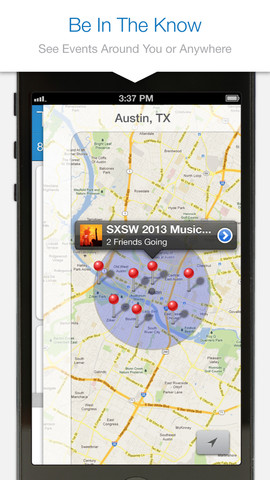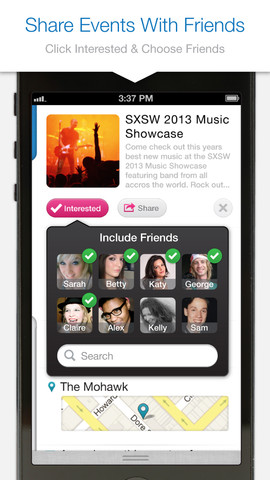OK, so maybe we said it would be hard for an app to break out at SXSW this year. But that isn’t stopping several startups from trying.
One startup called Hangtime, from serial entrepreneur Karl Jacob, is looking to be the comprehensive Rolodex of events at SXSW and beyond.
It pulls in events from Facebook that you have permission to see, ranks them by overall popularity, popularity among your friends and distance among other factors.
When you open the app, you can use Facebook to find friends and pull in hundreds of events. You can say you’re “interested” in going to them by clicking a button in the app. The idea is to get people to interact without necessarily committing to going to something.
“People don’t necessarily know what they are going to. Nobody likes to commit,” he said. “So we had to make it lightweight and make it super easy for people to share things with each other, but not commit.”
In Hangtime, there’s a way to say you’re publicly interested in an event, and then there’s a way to privately share an event with a friend.
 “That creates this bifurcation,” he said. “It’s a lightweight way of saying that you’re interested in something — but behind the scenes.”
“That creates this bifurcation,” he said. “It’s a lightweight way of saying that you’re interested in something — but behind the scenes.”
Hangtime follows a long line of events-related startups like the now-defunct Plancast and another startup Sosh that try to help people figure out what to do on nights and weekends.
Jacob says that other events startups might have just been too early on the market.
“The biggest mistake in the past in the core event discovery space was that we had a data problem,” he said. But he said now that social platforms like Facebook have solidified, it’s become a nicely centralized source of data.
In fact, the issue now is that there’s too much data and there needs to be better personalization and recommendations, he argues.
“A hallmark of these mobile applications is that they shouldn’t require work,” Jacob said. “They shouldn’t require you to enter in things. You have to give people a good experience out of the box.”
To get that, Jacob used a pretty ingenious seeding and testing strategy.
The company bought ads on Facebook targeted at colleges in the Midwest, such as the University of Missouri-Columbia and others in Arizona, Nebraska and Alabama. They want to see if they could remotely seed an app on a college campus and have it grow organically.
So they bought Facebook ads targeted at freshmen who wanted to find out what was going on on campus. Once a few people joined, they could pull in publicly shared events on Facebook and offer a better first-time experience to others who joined. When they felt the retention metrics were good and that they could predictably make the app popular on college campus after college campus, they decided to launch it publicly.
 The app has an Open Graph integration that puts a box on your Timeline of events you’ve been invited to and publicly expressed interest in. Whenever you interact with a Hangtime post on Facebook and like it, the person who submitted it will get a notification.
The app has an Open Graph integration that puts a box on your Timeline of events you’ve been invited to and publicly expressed interest in. Whenever you interact with a Hangtime post on Facebook and like it, the person who submitted it will get a notification.
That early testing helped set up a good base for SXSW this week. As of Friday, Hangtime already had 2 million invitations for at least 1,700 SXSW events with 285,000 RSVPs.
Next on the roadmap is improving personalization. Currently, Hangtime ranks events by overall popularity and timing by the hour, which means events that are more socially relevant but later in the day can show up lower in the feed.
“We’re in the process of building machine learning systems that literally take what you’re seeing and present new events that are more to your liking,” he said.
The 10-person company has $3.5 million in funding from investors, including SV Angel, Charles River Ventures, Greylock, Intel Capital, Interwest, 500 Startups, Crosslink Capital, Freestyle Capital, Ignition Venture Partners, Science Inc., Disney’s Tugboat Ventures and Webb Investment Network along with angels like Path CEO Dave Morin, Facebook alum and Pinterest monetization head Tim Kendall, Zynga’s Mark Pincus, One Kings Lane’s Ali Pincus and Data Collective’s Matt Ocko.
Jacob previously founded Keen, which was sold to AT&T in 2007 under the name Ingenio, and Dimension X, which was acquired by Microsoft. He was also CEO of Wallop, a social-networking company that eventually pivoted into making covers for smartphones and BlackBerrys under the name Coveroo.
